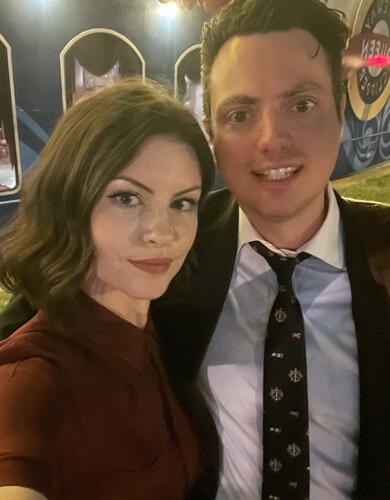June 8, 2023
Patriots for Empire: Unionism, Imperialism, and Scottish Colonial Administrators in the British Atlantic, 1698-1776

Congratulations to Zach Bates for successfully defending his PhD thesis, "Patriots for Empire: Unionism, Imperialism, and Scottish Colonial Administrators in the British Atlantic, 1698-1776." His committee members were Ken MacMillan, Lyndsay Campbell, Jewel Spangler, Owen Stanwood, and David Sigler (Department of English).
We asked Zach to provide us with some insight into his thesis and his graduate studies experience in the Department of History at the University of Calgary.
Tell us about your thesis topic
To put it in its most basic form, I studied a group of Scottish colonial administrators who served in the Atlantic world (inclusive of North American and the Caribbean) during the first three quarters of the eighteenth century and how their ideas of empire and experiences in the colonies influenced their political thought and practice. The predominant strands of their thinking involved their understanding of unionism that had been forged in the wake of the 1688 Revolution, which established a parliamentary monarchy, and the 1707 Act of Union, which created the Kingdom of Great Britain; and an enthusiasm for the continued expansion of Britain’s empire (at least in its Atlantic dimension). I have several sub-arguments in the thesis that deal with some of the origins of what I consider an older version of “British history” formulated by some of these administrators in the first half of the eighteenth century that would have profound influences on nineteenth-century concepts of ‘Manifest Destiny,’ the ‘Frontier,’ and the ‘melting pot’ concept of America’s national character. I also attempt to show that some of America’s earliest enthusiasts – especially Alexander Hamilton – relied on these same frameworks – especially union and empire – when they envisioned the United States of America. It is a topic that, I hope, speaks to a broad range of historians and scholars, as I engage with administrative documents, contemporary literature, early historical accounts, and private correspondence.
What was the most valuable outcome of the Graduate program for you?
I was able to secure a faculty position at a college in Georgia, which I initially started in August 2021. I also feel a certain amount of pride at completing my dissertation and believe that I have grown as a scholar, teacher, and person – and I hope that others can attest to this growth.
These accomplishments are not the result of only my own doing. Much of the credit must go to the graduate program at the University of Calgary and the professors who guided me along the way. Ken and Lyndsay did much to steer me to a safe port for research when I was initially – like many early graduate students – sailing the high seas without any firm land in sight. Ken’s ability to listen to me and then condense my thoughts into something coherent and intelligible was instrumental in me focusing my thesis project; and Lyndsay’s questions about constitutions helped me in ways that were not always apparent at first but led to a Eureka moment in 2021. Without their supervision, I would still be wondering the wilderness in search of fruit.
Another outcome that may have been less apparent or clear in 2018 or 2019 was developing a teaching style and methodology. The current job market – at least in the United States – seems to be shifting to valuing teaching skills, and Ken – again – was key in opening my mind to what kind of teacher I am. Fortunately, I was able to become an amalgam of the great faculty that I served under while at Calgary, beginning with Mark Konnert and Ken, then David Marshall and Warren Elofson, and finally with Jewel Spangler and Annette Timm. All of them contributed to the kind of teacher that I became and remain.
What are the next steps/plans for you?
My plans are to continue teaching at my current institution, Columbus Technical College. My research continues, however, and I hope to develop a book proposal based on my dissertation project, as task which I am currently completing. I am in the process of collecting contributions for an edited volume project with another alumni, James Forbes, on liberalism and the Anglo-American world. Finally, I have just had a panel proposal accepted at the annual NACBS meeting in Baltimore, so I am excited to present a developing project and meet my fellow panelists.
Most immediately, however, I have turned my attention to playing Live A Live, a videogame for all historians, I suppose, and some casual reading. In a sense, I am returning to some of my pre-graduate school hobbies a changed person, but they remain fun all the same.
